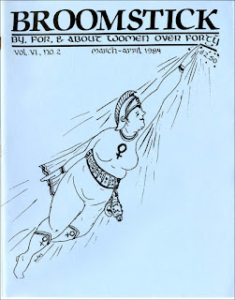From the June Mazer Lesbian Archives: Broomstick Magazine
 Broomstick was an independent, self-published radical feminist magazine dedicated to supporting and promoting women and lesbian activism and art for an audience of women over forty. Founded by Maxine Spencer and Polly Taylor in Berkeley, California, in 1978, it ceased publication in 1993. Its main goals were confronting ageism, stereotypes of the disabled, and breaking down gender conventions in publishing. and explores topics related to radical feminist politics, lesbian culture and art, spirituality of the Crone, women and aging, and feminist coalitions and communities. The collection contains a complete run of the magazine, organizational records, financial statements, correspondence, submissions and rejections, and many of the plates used for printing the magazine. The collection also contains Spencer’s personal papers documenting her personal experiences with radical feminism, lesbianism, disability, sexism, and age discrimination.
Broomstick was an independent, self-published radical feminist magazine dedicated to supporting and promoting women and lesbian activism and art for an audience of women over forty. Founded by Maxine Spencer and Polly Taylor in Berkeley, California, in 1978, it ceased publication in 1993. Its main goals were confronting ageism, stereotypes of the disabled, and breaking down gender conventions in publishing. and explores topics related to radical feminist politics, lesbian culture and art, spirituality of the Crone, women and aging, and feminist coalitions and communities. The collection contains a complete run of the magazine, organizational records, financial statements, correspondence, submissions and rejections, and many of the plates used for printing the magazine. The collection also contains Spencer’s personal papers documenting her personal experiences with radical feminism, lesbianism, disability, sexism, and age discrimination.
The idea for Broomstick was born when eight women over forty attended a Crone’s Caucus and organized a loose coalition that would support, fund, and collectively address concerns specific to older women. This peer-led group would also function as a supportive network for activism. Together, Spencer and Taylor approached “OPTIONS for Women Over Forty,” a newly formed feminist organization in Berkeley. They asked for its endorsement and financial support to create a feminist political journal for and about women over forty. In exchange, Spencer and Taylor pledged to publicize OPTIONS in the journal and promote its programs. Though OPTIONS gave initial support and funding, Broomstick eventually grew into an independently published and funded magazine, but financial insolvency led to its demise.
The materials are organized into four series: Magazine Production, Publicity, Administrative Records, and Author Files. The Magazine Production series documents the creative and physical production process of Broomstick from start to finish. It offers a unique perspective on the process of creating a grassroots, independent magazine. It contains layouts, typesettings, artwork and cartoons, articles used for research, letters to the editor, ideas for editorials, drafts and potential content for magazine columns, promotional contests, as well as a complete set of finished Broomstick issues, including Indexes–published annually cataloging authors, themes, and published issues–and a self-produced Writer’s Packet to guide contributors in the submission process. The other series are equally rich in material about the process of publishing, including developing ideas, managing finances, and getting attention.
The finding aid for this collection is available for viewing at the Online Archive of California (http://www.oac.cdlib.org/findaid/ark:/13030/c8br8sth/). Digitized materials from the collection and the finding aid will be available for viewing on the UCLA Library’s Digital Collections website. This research is part of an ongoing CSW research project, “Making Invisible Histories Visible: Preserving the Legacy of Lesbian Feminist Activism and Writing in Los Angeles,” with Principal Investigators Kathleen McHugh, CSW DIrector and Professor in the Departments of English and Cinema and Media Studies at UCLA
(on sabbatical from April to June, 2013) and Gary Strong, University Librarian at UCLA. Funded in part by an NEH grant, the project is a three-year project to arrange, describe, digitize, and make physically and electronically accessible two major clusters of June Mazer Lesbian Archive collections related to West Coast lesbian/feminist activism and writing since the 1930s.
For more information on this project, visit http://www.csw.ucla.edu/research/projects/making-invisible-histories-visible
For more information on the activities of the Mazer, visit http://www.mazerlesbianarchives.org

